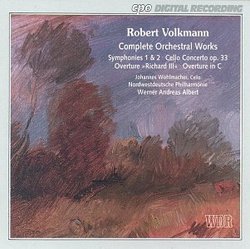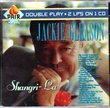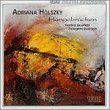| All Artists: Robert Volkmann, Werner Andreas Albert, Nordwestdeutsche Philharmonie Title: Robert Volkmann: Complete Orchestral Works Members Wishing: 0 Total Copies: 0 Label: Cpo Records Release Date: 6/28/1994 Genre: Classical Styles: Forms & Genres, Concertos, Instruments, Strings, Symphonies Number of Discs: 2 SwapaCD Credits: 2 UPC: 761203915125 |
Search - Robert Volkmann, Werner Andreas Albert, Nordwestdeutsche Philharmonie :: Robert Volkmann: Complete Orchestral Works
 | Robert Volkmann, Werner Andreas Albert, Nordwestdeutsche Philharmonie Robert Volkmann: Complete Orchestral Works Genre: Classical
|
Larger Image |
CD DetailsSimilar CDs
|
CD ReviewsRobert Volkmann a great musician among the minor G.D. | 05/10/2001 (4 out of 5 stars) "Robert Volkmann (1815-1883) although today is not very well-known, in its time he enjoyed certain fame, it was contemporary of big musicians like Schumann, Brahms and Listz to who knew. He also received support in their musical activity of Hans von Bullow. From 1841 he lived in Budapest, until their death. Their music has the melody and the romantic force characteristic of that time, for anything worthless to listen these disks. I believe that it is a good investment, a good experience, and one can end up knowing the quality of the atmosphere musical European of the XIX century better. When one ends up concluding that this he is a great musician among the minor, as some they call." What is it that makes a composer a "minor" one? Not much, in Discophage | France | 01/23/2010 (5 out of 5 stars) "This 2-CD set devoted to Robert Volkmann's orchestral output continues my exploration of the "minor" Romantic composers of the Austro-German area, which began with Fibich (Fibich: Symphony No. 1 in F major, Op. 17; The Tempest, Op.46 and Zdenek Fibich: Symphonies Nos. 2 & 3) and Bruch (Bruch: The 3 Symphonies, Swedish Dances (Schwedische Tanze)). The symphonies of Fibich were a chance encounter on the famous auction site, and they raised the nagging question: what is it that makes it the music of a "minor" composer, as opposed to the music of the "major" composers of the Romantic era. The pantheon of those is well established, I think; in chronological order: Beethoven, Weber, Schubert, Mendelssohn, Schumann, Liszt, Wagner, Bruckner, Brahms, Mahler and Strauss. Volkmann's birth date places him between Wagner and Bruckner, and makes him Brahms' elder by 18 years. And the tentative answer to that question, so far, is that, as enjoyable as it may be, it never gives you the impression that you haven't heard it before. Volkmann - like Bruch - is a good case in point, on both aspects: it rarely gives you the impression that you haven't heard it before; it is highly enjoyable nonetheless. Born near Dresden, Volkmann visited Schumann during his student years in Leipzig, and became a close friend of Brahms in 1864. Other than a four-year stint in Vienna (1854 -1858), his chosen home base was Budapest until his death in 1883 (same year as Flotow and Wagner). It is Liszt's and Van Bülow's embrace of his Piano Trio in b-flat minor in 1850 that gave him his shot at fame: hence his move to Vienna, but that ultimately didn't bring the envisioned success. The Cello Concerto was composed in the wake of the success of the Piano Trio (1853-55). Symphony No. 1 was completed in 1863 and No. 2 in 1865, which places them more than 20 years after the first ones of Schumann (and more than ten years after the "Rhenish"), and more than ten years before those of Brahms. Bruch's respective three symphonies were composed in 1868, 1870 and 1883-6. The Overture in C is contemporary with the Symphonies and the date of the Richard III Overture is not given, but its opus number seems to make it a later work than the rest. Yes, there is much in Volkmann First Symphony that reminded me of Schumann (and, in the slow movement, strikingly the "Beethovenian" Schumann of the 4th Symphony), a little bit of Brahms. As the liner notes rightly point out, Volkmann (unlike Liszt or Berlioz) held on to the classical forms and architecture, and thus provides a link between Beethoven and Brahms. It is enjoyable music, very powerful and dramatic at times (try the opening of Symphony No. 1), Romantically "sturm und drang" (this is an anachronism in the definition of music styles, but not in the emotional content conveyed by the music), although it doesn't always avoid the triumphant bombast (as in some passages of the 1st Symphony's first movement). If you think of Beethoven, think of the Egmont Overture. The Overture "Richard III" is in fact a tone poem, not the overture to an actual opera, although its looseness of form and descriptive character is very redolent of the opera. It has pages of irresistible dramatic sweep and great romantic passion (the best Schumann again comes to mind). Volkmann's 2nd Symphony is to his first what Brahms' second is to HIS first: a sunny and lighthearted counterpart to a dramatic and turbulent statement, which doesn't exclude moments of great dramatic intensity as well, pointing to Brahms even. The second movement has a marvellous elegance, and some passages brought to mind the ballet music of some Haendel operas. The ensuing andantino opens with a beautiful and plangent oboe melody, soon joined by French horn, displaying Volkmann's superb sense of color. The andantino runs into a finale in jaunty dotted rhythms that bring back Schubert's 9th to mind, and whose final pages even attain an exhilarating Brahmsian sweep. That finale alone makes me upgrade what was going to be a four-star rating into five-stars - and the Cello Concerto confirms it. It provides a "missing link" between Schumann's (1850) and Dvorak's (1895). It is more advanced than Schumann's, including in its very original, one-movement formal layout which makes it a "Rhapsody" more than a Concerto in the traditional sense. It boasts a near continuous melodic line for the cello, often written in the sol clef (the cello's upper baritonal and most lyrical register) and apparently in highly virtuosic manner, including a number of gorgeous cadenzas. The Concerto should be in the repertoire of every serious cellist and would make a perfect discmate to Schumann's. To me Brahms was the towering Austro-German symphonist of the 19th Century (at least, until the time of Mahler), and IMO nobody approaches him, although Bruckner's idiosyncratic style does set him apart. But I find Volkmann's symphonies (and concerto) not inferior to Schumann's and Mendelssohn's, although they may not have the melodic distinctiveness of the latter. Maybe if I listened to Schumann's and Mendelssohn's symphonies immediately after Volkmann's their superiority would sound obvious, but when I am listening to Volkmann I hear nothing to explain their popularity and his neglect. The full score to Symphony No. 1 and piano score to the Cello Concerto are available for free download from the International Music Score Project Library. We are living great times! Cellist Andreas Wohlmacher sounds remarkably full toned and precise, Werner Andreas Albert and his orchestra play all the notes, at tempos close to the score's metronome marks (overall slightly slower in the slow movement, which might have benefited from a marginally more flowing pace), and they are not wanting in power. Now I'd love to hear an alternative version, that would take it a little more in the Toscanini manner: more bite, forward movement, not so much relaxing of tempo in the more lyrical sections to keep the tension high. But I doubt that this will ever happen, and this set is more than serviceable." Very interesting music in adequate performances G.D. | Norway | 12/03/2009 (4 out of 5 stars) "Robert Volkmann (1815-1883) is one of the names that are sometimes encountered in music history and reference works, but his music is rarely heard. This double disc set includes all his orchestral works, apart from the serenades for strings, and reveals a skillful and at least intermittently inspired craftsman with a modestly individual voice. The performances leave something to be desired, but few of these works exist in available alternative performances, so this set should be of real interest nonetheless. Volkmann was a friend of Liszt and Brahms, and stylistic points of reference to both are certainly audible. He was also considered to be a figure of some importance in his day.
The Liszt connection is probably most expressed in the really excellent overture to Richard III - though called an overture it seems, in fact, to be very much a symphonic poem, effectively depicting the events and even quoting `The Campbells are coming'. It is also an inventive, colorful and darkly dramatic work, rather episodic, and definitely worth hearing. The performance is a little thin-bodied, however, not quite realizing the full atmosphere or drama of this music. This is the only work in the set for which I've actually heard an alternative performance under Ondrej Lenard (available on Naxos), and the latter is - if not exactly refined either -noticeably more urgently dramatic and colorful. The Overture in C major op. posth. is less distinctive in terms of thematic material, if formally less sprawling. The first symphony wasn't composed until the 1860s, but Volkmann followed it with the sequel just a year later - and it is very much a response to its predecessor, with the brighter, more optimistic second being conceivable as an answer to many of the doom-laden, darkly troubled questions of the first. Stylistically they are, perhaps, closer to Schumann than to Brahms or anyone else, but contain many individual touches that, if anything, point more strongly to later composers than any of Volkmann's predecessors. Some of the themes, e.g. the main theme of the first movement of the first, are genuinely memorable, and he manages to provide some ingenious touches in the developments. Overall the works are - if of course not in the league of the Brahms symphonies - far better than their received fate should suggest. The cello concerto also has alternative performances (Hyperion and Koch Schwann, at least - I have not heard either); it is a single-movement work, quite modest in stature, but quite a find anyway. Written in 1853-55, the work is concentrated and effective with some superb themes -a genuine richness, of them, in fact - and convincing developments and thematic interactions; it does indeed deserve a life in the concert halls. But do the performances stand up? I am a little hesitant to give full score here - it seems that Werner Andreas Albert has the measure of the various works, but the Norddeutsche Philharmonie sounds thin and the performances are somewhat rough, even though the players manage to put some drama and atmosphere into the symphonies. The superiority of the alternative performance of Richard III worries me a little when it comes to the rest as well - Wohlmacher is pretty good in the concerto, however - maybe the problem is that Volkmann doesn't come across as a master orchestrator, and that he therefore needs more special care than he can get here? The somewhat flat and dry, but clear, sound quality might be part of the problem as well. In any case, I am happy to have these discs, and I will still recommend this set to anyone with an interest in high-quality byways of romantic music. Awarding the set four stars might be generous given the performances, but at least the music deserves it." |

 Track Listings (5) - Disc #1
Track Listings (5) - Disc #1



